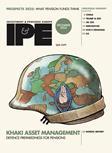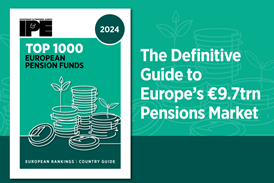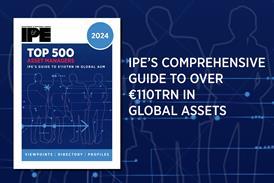All Opinion Pieces articles – Page 4
-
 Opinion Pieces
Opinion PiecesViewpoint: Solving Europe’s capital markets puzzle
The crucial role of capital markets has recently figured on top of several high-level reports on Europe’s economic priorities
-
 Opinion Pieces
Opinion PiecesTime is running out for Germany's planned pension reforms
The German government is in the final stretches of an ambitious but tortuous journey to reform the three pillars of the pension system.
-
 Opinion Pieces
Opinion PiecesUS public pension funds focus on labour practices in private equity
Private equity has become dependent on public pension funds, which represent almost one-third of all investors in the asset class. These schemes invested 13% of their assets – over $620bn (€580bn) in 2022 – up from 3.5% in 2001 and 8.3% in 2011, according to data from public pension research non-profit Equable Institute.
-
 Opinion Pieces
Opinion PiecesDefence is the new ESG question
Earlier this year, the European Commission launched its ambitious European Defence Industrial Strategy (EDIS). The main goals of the strategy are reducing fragmentation within the €70bn European defence industry and lowering weapons imports, thus increasing the EU’s military readiness. The success of the strategy would also contribute to economic growth.
-
 Opinion Pieces
Opinion PiecesStriking the right balance on pension funds and fiduciary duty
Pension fund investment principles, strategies and decision-making have all become more complex in the wake of the growth of sustainability factors in general and climate change in particular. This has made the interpretation and practice of trustee ‘fiduciary duties’ more vexed and challenging than ever. A recent review of fiduciary duties in the UK by the Financial Markets Law Committee (FMLC) put it this way: “It is sometimes easier to state the duties than it is to apply them.”
-
 Opinion Pieces
Opinion PiecesAustralia faces up to the cost of pandemic pension early release
Four years after Australians were allowed to withdraw superannuation savings to deal with the economic shock of the COVID-19 pandemic, they now know emergency measures will cost the nation A$85bn (€51bn) in future pension payments.
-
 Opinion Pieces
Opinion PiecesBond markets look set to become the new stewardship powerbroking arena
Investors in bond markets are starting to assume a more powerful position than equity investors to influence companies and countries. Innovation is sweeping through bond markets with the introduction of specific ‘use of proceeds’ bonds and sustainability-linked bonds.
-
 Opinion Pieces
Opinion PiecesEnrico Letta’s European 401(k) policy is ambitious but necessary
Enrico Letta’s long-awaited review of the EU single market (Much More than a Market), reached inboxes last month. Among a sweeping range of measures, Letta advocates an ambitious system, akin to the 401(k) in the US, with an EU-wide auto-enrolment long-term savings policy as part of a proposed Savings and Investment Union.
-
 Opinion Pieces
Opinion PiecesViewpoint: Trump election agenda items for pension funds to debate
Peter Kraneveld identifies Trump’s election chances as an important political risk for pension funds
-
 Opinion Pieces
Opinion PiecesViewpoint: What if climate policy wasn’t ‘backsliding’?
Nothing screams policy forward-sliding like a solar sector unleashed, permanently beating scenario expectations
-
 Opinion Pieces
Opinion PiecesA new era for pension fund liquidity management
With inflation past its peak and central banks signalling monetary easing, investors can look forward to a prolonged period when interest rates will be at normal levels – barring any surprise decline in economic growth or other kinds of shocks.
-
 Opinion Pieces
Opinion PiecesWhy General Electric’s pension management model has finally passed its prime
The late Jack Welch, CEO of General Electric for two decades until 2001, was not only a legendary businessman who grew GE’s market cap 30-fold over his tenure. He also inspired a minor revolution in pension fund management that dates back to the days of mainframe computers and telex machines.
-
 Opinion Pieces
Opinion PiecesCould Dutch pension reforms still be reversed?
1 January 2025: that’s the day the first Dutch pension funds will move to a defined contribution (DC) system according to the new Pension Act. So the clock is ticking for politicians who still hope to reverse the pension changes, or give members a say on the mandatory conversion of defined benefit (DB) accruals to DC capital, the most controversial part of the pension reform.
-
 Opinion Pieces
Opinion PiecesUS pension plans wrestle with China private market exposure
After a horrible 2023, Chinese stocks look cheap and attractive. But most US pension funds do not seem interested in investing in the Chinese stock market. On the contrary, they have reduced their holdings since 2020 and some are exiting entirely, according to Bloomberg analysis.
-
 Opinion Pieces
Opinion PiecesAn opportunity to reimagine private capital in Europe
Enrico Letta’s long-awaited report on the future of the European Union’s single market is set to spark a major debate among EU leaders. As Europe faces a rapidly evolving strategic landscape, the former Italian prime minister’s findings, due to be published this spring, could help shape thinking on European integration ahead of the upcoming elections in June.
-
 Opinion Pieces
Opinion PiecesAustralia connects retirement income sources
Australia, a country with the world’s fourth-largest pool of retirement savings, is caught in a curious bind. At issue is how to transition Australians from saving to spending.
-
 Opinion Pieces
Opinion PiecesATP at 60: no plans to retire the guaranteed pensions model
Now approaching retirement age itself, Danish statutory pension fund ATP is using its 60th birthday as an opportunity to reinforce the validity of its guarantee-based investment model.
-
 Opinion Pieces
Opinion PiecesViewpoint: The case for investing in water
Peter Kraneveld argues that there is a compelling financial as well as moral case for investing in water projects
-
 Opinion Pieces
Opinion PiecesABP pledges €30bn for new impact investments
Some €5bn will be invested in affordable housing projects in the Netherlands
-
 Opinion Pieces
Opinion PiecesViewpoint: The SEC should not diverge on Scope 3
Reporting of value chain emissions, whether upstream such as purchased goods, or downstream – such as product use (think combustion of fossil fuels), will be abandoned





